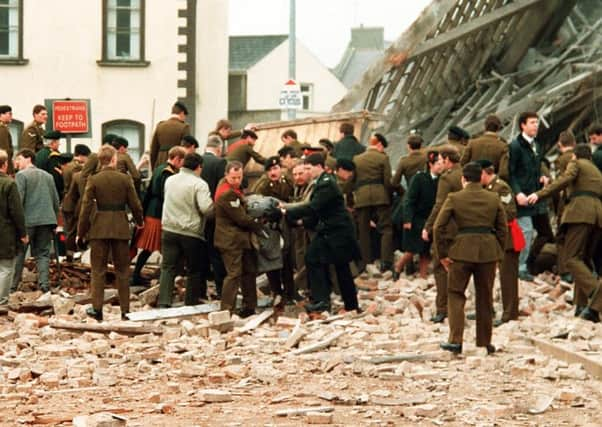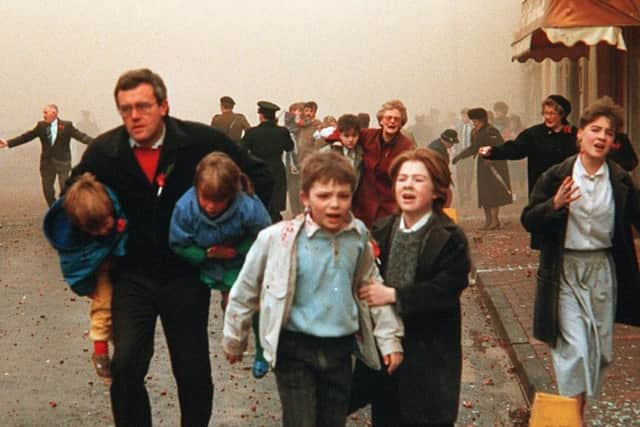Enniskillen: How a murderous act of desecration sent shockwaves around the world


The terrorist bomb that killed eleven people – who had gathered to pay their respects to the fallen of two world wars – provoked international outrage, and previously unthinkable revulsion in some republican circles.
Sunday, November 8, 1987 was a new low for the IRA, later viewed by many as the beginning of the end of Provos’ violent campaign.
Advertisement
Hide AdAdvertisement
Hide AdAmong the dead were three elderly couples, a widowed WRAF war veteran, a nurse and a police reservist. All were Protestants.


A twelfth victim of the blast – school principal Ronnie Hill – lapsed into a coma a result of his injuries and died 13 years later without regaining consciousness.
Some of the 63 people injured still suffer chronic pain from their wounds.
Prime Minister Margaret Thatcher condemned the mass murder as “utterly barbaric” and said that there “should be no hiding place in any country” for those responsible for the attack.
Advertisement
Hide AdAdvertisement
Hide AdTaoiseach Charles Haughey said: “The culprits must be utterly repudiated and brought to justice.”


SDLP leader John Hume described the bomb as “a direct attack on the unionist community”.
Even the Libyan government under the leadership of Colonel Gaddafi – which was supplying the IRA with weaponry and explosives – released a statement saying the attack could not be justified.
Through the Libyan Press Association, it said: “Libya is aware of the difference between legitimate revolutionary action and terrorism aimed at civilians and innocent people. This action does not belong to the legitimate revolutionary operation.”
Advertisement
Hide AdAdvertisement
Hide AdAs the scale of the horror was unfolding, it also emerged that the terrorists has planned even greater carnage with a much larger bomb at the border village of Tullyhommon, 20 miles from Enniskillen.
That device was defused by army experts after it apparently failed to explode in the vicinity of a Remembrance Day parade involving young members of the Boys’ and Girls’ Brigade.
The worldwide condemnation prompted the IRA to release a statement the following day expressing “deep regret” at the loss of civilian life.
No one has ever been convicted for offences related to the atrocity.
Advertisement
Hide AdAdvertisement
Hide AdIn an act of defiance, Margaret Thatcher travelled to Enniskillen for the rescheduled Remembrance service a fortnight after the bombing.
Days earlier, Prince Charles and Princess Diana paid a surprise visit some of the injured at the Erne Hospital.
A year later, Diana returned to Enniskillen to lay a wreath at an incredibly poignant Armistice Day commemoration.
The Queen also sent her “heartfelt sympathy” to the people of Enniskillen, and would visit the town during her Diamond Jubilee celebrations in 2012 – meeting survivors and families of the bomb victims.
Advertisement
Hide AdAdvertisement
Hide AdWithin a year of the Enniskillen bombing, IRA members in the area would embark on a killing spree which left four more Protestant civilians dead - Gillian Johnston, Fredrick Love, William Hassard and Harry Keys.
The IRA later claimed to have “stood down” the team responsible due to unease in republican ranks.
Ten years after what became known as the Poppy Day bombing, Sinn Fein president Gerry Adams said he was ‘deeply sorry about what happened in Enniskillen,” but told the BBC there could only be a “guarantee of a peaceful future” when the root causes of the conflict were tackled and resolved.
Then, during the Irish presidential election campaign in 2011, Sinn Fein candidate Martin McGuinness said he felt shame over some incidents, such as the Enniskillen bombing, carried out in the name of Irish republicanism, and described the cenotaph attack as “atrocious”.
Advertisement
Hide AdAdvertisement
Hide AdDuring an interview with RTE, he said: “I feel ashamed when incidents like that happened.”
Earlier this year, former IRA prisoner and Maze blanket protestor Anthony McIntyre said the Enniskillen atrocity caused many republicans to question the validity of their armed actions.
“In terms of an operation having an impact in a way that would have dissuaded those thinking about a [IRA] military option, it was the operation...in Fermanagh, where they killed the people [at the Remembrance service] in Enniskillen,” he told the News Letter.
“Enniskillen had more of an impact and you could see a change in the discourse. The IRA operations in Fermanagh after that led to the comments from [Gerry] Adams that ‘the IRA must be careful and careful again.’ Then you had [Martin] McGuinness saying that the unit that killed [former RUC reservist] Harry Keys and then [Belleek shop worker] Gillian Johnston should be stood down.”
Advertisement
Hide AdAdvertisement
Hide AdIn the immediate aftermath of the bombing, the father of murdered nurse Marie Wilson said their should be no “dirty talk” of retaliation, as well as saying he forgave those responsible.
Interviews with Gordon Wilson – saying he bore “no ill-will and no grudge” towards the killers - made the news around the world.
But for many victims the mental scars won’t begin to heal until the perpetrators are brought to justice.
Speaking to the News Letter ahead of tomorrow’s 30th anniversary, Stephen Gault said the pain from the death of his father Samuel had been compounded by the police failure to track down those responsible for the killings.
“I know it’s 30 years on but it gets no easier.
“The rawness never goes away,” he said.